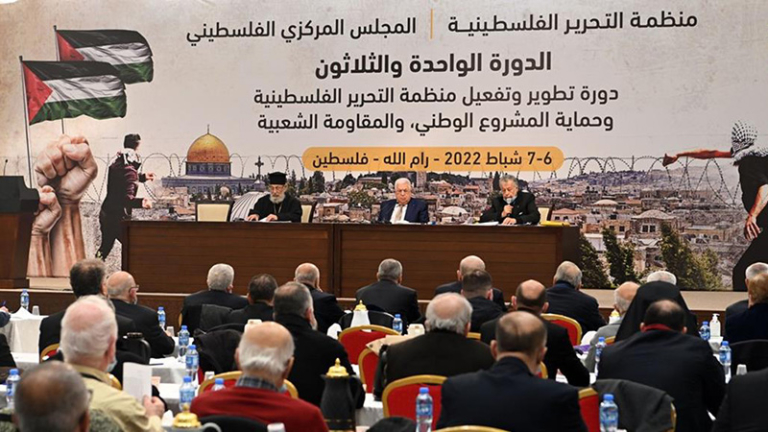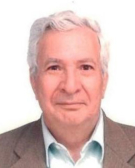
The meeting of the Palestinian Central Council (PCC), held in Ramallah on February 6, received more attention in the news media than was warranted for a number of considerations. The first concerns the conditions faced by Palestinians not only in territories occupied in 1967 or in 1948, but also those who live in the diaspora. Holding the 31st council meeting in Ramallah obscures the multilayered facets of Israel’s settler colonialism and conditions of apartheid, dispossession, and discrimination governing the lives of most Palestinians. The meeting by a Palestinian national body in Ramallah, a city under occupation, gives the illusion of normality that obfuscates the reality of Israel’s long-standing settler-colonial and brutal presence in historic Palestine. Evidence of the ubiquitous military settler-colonial reality was demonstrated during the PCC meeting when an Israeli special unit entered Nablus and assassinated three Palestinian youths accused of shooting at Israeli soldiers and settlers. This is in addition to the continuing expansion of Israel’s illegal settlements in the occupied West Bank and its “Bantustanization,” the ghetto status imposed on the Gaza Strip, and the continuation of Israeli control over borders, natural resources, and the movement and economy of the Palestinians.
The second consideration is the 15-year split between the two main Palestinian political factions that perform the functions of self-government in the West Bank (Fatah) and Gaza Strip (Hamas). All the attempts at reconciliation have failed. The convening of the PCC meeting without any overall agreement of the active components of the Palestinian political movement is likely to deepen the split and transform it into a permanent separation. As is well known, the council’s meeting was boycotted by active factions (the Popular Front for the Liberation of Palestine, Islamic Jihad, and Hamas) together with other small factions, as well as a number of independent members, including Hanan Ashrawi. The Palestinian National Initiative was not invited to participate in the meeting. In short, Palestinians were not prepared for the meeting. Hence many believed that convening it would make the task of reconciliation even more difficult, especially that it is already burdened with issues related to the Oslo Accords, resistance to occupation, negotiations with Israel, and the overdue Palestinian National Council elections.
The convening of the PCC meeting before ensuring consent from the main components of the Palestinian national movement has provoked speculation that the goal was, first, to obstruct calls for restructuring PLO institutions on a democratic and representative basis, after being marginalized by the Palestinian Authority (PA) following the signing of the Oslo Accords. Second, it aimed to undermine calls for local, legislative, and presidential elections because the existing political class suspects that the results would not be favorable, as recent public opinion polls clearly indicated.
The third main consideration relates to resolutions taken by the PCC. Although on paper they addressed Palestinians’ wishes, no one took them seriously because of a history of disappointments. These included a resolution “to terminate the obligations of the PLO and the Palestinian Authority of all agreements signed with Israel.” The PCC’s official communiqué added that the acceleration of Israel’s confiscation of Palestinian land also contributed to the above-mentioned decision. It added that Israel “is trying to obstruct the achievement of the independence and sovereignty of the Palestinian people on their land in accordance with the resolutions of international legitimacy.” Furthermore, the council “decided to suspend the recognition of the State of Israel until it recognizes the independent state of Palestine on the 1967 borders, with East Jerusalem as its capital, and the cessation of settlements.”
If acted upon, the resolution that reiterated the suspension of certain security coordination activities with Israel would have immediate repercussions on Israel-PA relations. The resolution emphasized the PLO’s rejection of economic initiatives and confidence-building measures with Israel that, at base, are meant to avoid a more permanent peaceful solution. It is worth recalling that the Palestinian National Council (PNC) passed a resolution in April 2018 to suspend all security coordination with Israel until Israel recognizes the Palestinian state.
What is noticeable about the language of the PCC official communiqué is the total commitment to the Oslo Accords, hence the absence of issues concerning the future of Palestinians outside the 1967 occupied territories, particularly refugees and Palestinians in the areas occupied and colonized in 1948. No policies are inferred from recent reports by Human Rights Watch and Amnesty International, which characterized Israeli policies in all of historic Palestine—the area between the Jordan River and the Mediterranean Sea—as apartheid.
Finally, the fact remains that resolutions presented by the February meeting of the PCC were passed by different Palestinian bodies (including the Executive Committee of the PLO) without any explanation or plans for implementation, and this generated the indifference characterizing the reception of these resolutions. Of equal importance is the fact that the resolutions are not taken seriously by Israel, regional actors, or the United States. This is why the PCC meeting and its outcome stirred little interest and no excitement among Palestinians, in the region, and internationally.
The delegation of PNC powers and functions to the PCC was seen as further evidence of the PA leadership’s marginalization of PLO institutions. This was illustrated by the fact that the PA filled vacancies with persons known for their support of the incumbent PA President Mahmoud Abbas, who is also the chairman of the PLO’s Executive Committee and leader of Fatah, the largest of the Palestinian factions. Therefore, many Palestinians expect the strengthening of the authoritarian tendencies in the PA and a repetitive surge of uprisings against both Israeli racist repression and discrimination and Palestinian authoritarian rule. These are likely to intensify as the issue of succession to Abbas becomes an urgent one, together with the ongoing political impasse.

